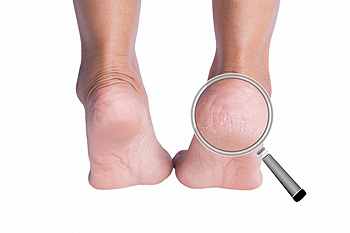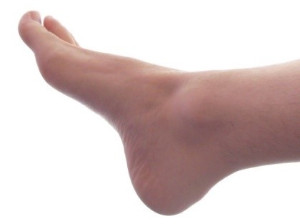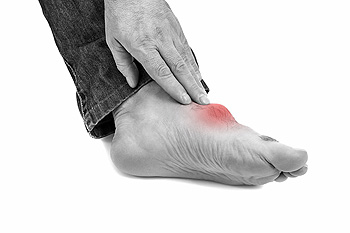Items filtered by date: October 2020
Why Are My Heels Cracked?
 Cracked heels can be unsightly and painful. A combination of the foot’s inability to retain moisture and pressure on the foot can cause the skin of the heels to become fragile and eventually crack. Without treatment, the cracks can get deeper and turn into fissures. Common causes of cracked heels include a lack of moisture, vitamin deficiencies, pressure, aging skin, obesity, open footwear, hygiene, or poorly fitted shoes. Various moisturizers are available to help prevent or treat cracked heels. However, if you are suffering from painful cracks, a podiatrist may be able to help you find the source of your problem and provide treatment options.
Cracked heels can be unsightly and painful. A combination of the foot’s inability to retain moisture and pressure on the foot can cause the skin of the heels to become fragile and eventually crack. Without treatment, the cracks can get deeper and turn into fissures. Common causes of cracked heels include a lack of moisture, vitamin deficiencies, pressure, aging skin, obesity, open footwear, hygiene, or poorly fitted shoes. Various moisturizers are available to help prevent or treat cracked heels. However, if you are suffering from painful cracks, a podiatrist may be able to help you find the source of your problem and provide treatment options.
If the skin on your feet starts to crack, you may want to see a podiatrist to find treatment. If you have any concerns, contact one of our podiatrists from Parkwood Podiatry. Our doctors can provide the care you need to keep you pain-free and on your feet.
Cracked Heels
It is important to moisturize your cracked heels in order to prevent pain, bleeding, and infection. The reason cracked heels form is because the skin on the foot is too dry to support the immense pressure placed on them. When the foot expands, the dry skin on the foot begins to split.
Ways to Help Heal Them
- Invest in a good foot cream
- Try Using Petroleum Jelly
- Ease up on Soaps
- Drink Plenty of Water
Ways to Prevent Cracked Heels
- Moisturize After Showering
- Skip a Shower
- Keep Shower Water Lukewarm
- Don’t Scrub Your Feet
If you are unsure how to proceed in treating cracked heels, seek guidance from a podiatrist. Your doctor will help you with any questions or information you may need.
If you have any questions, please feel free to contact our offices located in Brunswick and Hinesville, GA . We offer the newest diagnostic and treatment technologies for all your foot care needs.
Plantar Hyperhidrosis May Increase the Risk of Other Foot Conditions
 Patients who have excessively sweaty feet may experience a condition that is referred to as plantar hyperhidrosis. This ailment can occur as a result of overactive sweat glands which produce sweat when cooling the body is not necessary. Plantar hyperhidrosis may increase the risk for other foot conditions to develop, including athlete’s foot, warts, and corns. Additionally, shoes may fall off of your feet due to the excess sweat making them slippery, and there may be a strong odor that comes from the feet and shoes. If you are afflicted with plantar hyperhidrosis, it is suggested that you speak with a podiatrist who can determine what the best treatment is for you.
Patients who have excessively sweaty feet may experience a condition that is referred to as plantar hyperhidrosis. This ailment can occur as a result of overactive sweat glands which produce sweat when cooling the body is not necessary. Plantar hyperhidrosis may increase the risk for other foot conditions to develop, including athlete’s foot, warts, and corns. Additionally, shoes may fall off of your feet due to the excess sweat making them slippery, and there may be a strong odor that comes from the feet and shoes. If you are afflicted with plantar hyperhidrosis, it is suggested that you speak with a podiatrist who can determine what the best treatment is for you.
If you are suffering from hyperhidrosis contact one of our podiatrists of Parkwood Podiatry. Our doctors can provide the care you need to attend to all of your foot and ankle needs.
Hyperhidrosis of the Feet
Hyperhidrosis is a rare disorder that can cause people to have excessive sweating of their feet. This can usually occur all on its own without rigorous activity involved. People who suffer from hyperhidrosis may also experience sweaty palms.
Although it is said that sweating is a healthy process meant to cool down the body temperature and to maintain a proper internal temperature, hyperhidrosis may prove to be a huge hindrance on a person’s everyday life.
Plantar hyperhidrosis is considered to be the main form of hyperhidrosis. Secondary hyperhidrosis can refer to sweating that occurs in areas other than the feet or hands and armpits. Often this may be a sign of it being related to another medical condition such as menopause, hyperthyroidism and even Parkinson’s disease.
In order to alleviate this condition, it is important to see your doctor so that they may prescribe the necessary medications so that you can begin to live a normal life again. If this is left untreated, it is said that it will persist throughout an individual’s life.
A last resort approach would be surgery, but it is best to speak with your doctor to find out what may be the best treatment for you.
If you have any questions please feel free to contact our offices located in Brunswick and Hinesville, GA . We offer the newest diagnostic and treatment technologies for all your foot and ankle needs.
Gout 101
 Gout is a form of inflammatory arthritis that affects the big toe and can cause severe joint pain. Gout is three times more likely to affect men than women. A proper diagnosis will require a podiatrist to assess the foot and rule out other possible diagnoses. Upon a gout diagnosis, medications such as anti-inflammatory drugs or corticosteroids may be prescribed. However, the typical primary treatment method for gout involves reducing uric acid levels in the blood. While there are many prescriptions that may help reduce these levels, diet is key. Avoiding high purine foods, sugary drinks, and alcohol will help reduce uric acid levels. If you believe that you are suffering from gout, consult with a podiatrist for a proper diagnosis and treatment.
Gout is a form of inflammatory arthritis that affects the big toe and can cause severe joint pain. Gout is three times more likely to affect men than women. A proper diagnosis will require a podiatrist to assess the foot and rule out other possible diagnoses. Upon a gout diagnosis, medications such as anti-inflammatory drugs or corticosteroids may be prescribed. However, the typical primary treatment method for gout involves reducing uric acid levels in the blood. While there are many prescriptions that may help reduce these levels, diet is key. Avoiding high purine foods, sugary drinks, and alcohol will help reduce uric acid levels. If you believe that you are suffering from gout, consult with a podiatrist for a proper diagnosis and treatment.
Gout is a foot condition that requires certain treatment and care. If you are seeking treatment, contact one of our podiatrists from Parkwood Podiatry. Our doctors will treat your foot and ankle needs.
What Is Gout?
Gout is a type of arthritis caused by a buildup of uric acid in the bloodstream. It often develops in the foot, especially the big toe area, although it can manifest in other parts of the body as well. Gout can make walking and standing very painful and is especially common in diabetics and the obese.
People typically get gout because of a poor diet. Genetic predisposition is also a factor. The children of parents who have had gout frequently have a chance of developing it themselves.
Gout can easily be identified by redness and inflammation of the big toe and the surrounding areas of the foot. Other symptoms include extreme fatigue, joint pain, and running high fevers. Sometimes corticosteroid drugs can be prescribed to treat gout, but the best way to combat this disease is to get more exercise and eat a better diet.
If you have any questions please feel free to contact our offices located in Brunswick and Hinesville, GA . We offer the newest diagnostic and treatment technologies for all your foot and ankle needs.
Plantar Warts Can Be Treated!
Types of Achilles Tendon Injuries
 Tendons are bands of tissue that connect muscles and bones together. The Achilles tendon is located on the back of the ankle and connects the calf muscles to the heel. Tendonitis occurs when the tendon becomes inflamed. Tendinosis occurs when the tendon degenerates, usually due to overuse. Paratenonitis is a result of tissue around the tendon becoming inflamed and thickened, eventually attaching to the tendon. Insertional Achilles tendinopathy happens when the fibers attaching to the heel bone inflame and eventually degenerate. Another serious injury that can happen is an Achilles tendon rupture, which will make walking and standing extremely difficult and will likely require surgery. Because of the seriousness of Achilles tendon injuries, seeing a podiatrist for diagnosis and treatment is very important.
Tendons are bands of tissue that connect muscles and bones together. The Achilles tendon is located on the back of the ankle and connects the calf muscles to the heel. Tendonitis occurs when the tendon becomes inflamed. Tendinosis occurs when the tendon degenerates, usually due to overuse. Paratenonitis is a result of tissue around the tendon becoming inflamed and thickened, eventually attaching to the tendon. Insertional Achilles tendinopathy happens when the fibers attaching to the heel bone inflame and eventually degenerate. Another serious injury that can happen is an Achilles tendon rupture, which will make walking and standing extremely difficult and will likely require surgery. Because of the seriousness of Achilles tendon injuries, seeing a podiatrist for diagnosis and treatment is very important.
Achilles tendon injuries need immediate attention to avoid future complications. If you have any concerns, contact one of our podiatrists of Parkwood Podiatry. Our doctors can provide the care you need to keep you pain-free and on your feet.
What Is the Achilles Tendon?
The Achilles tendon is a tendon that connects the lower leg muscles and calf to the heel of the foot. It is the strongest tendon in the human body and is essential for making movement possible. Because this tendon is such an integral part of the body, any injuries to it can create immense difficulties and should immediately be presented to a doctor.
What Are the Symptoms of an Achilles Tendon Injury?
There are various types of injuries that can affect the Achilles tendon. The two most common injuries are Achilles tendinitis and ruptures of the tendon.
Achilles Tendinitis Symptoms
- Inflammation
- Dull to severe pain
- Increased blood flow to the tendon
- Thickening of the tendon
Rupture Symptoms
- Extreme pain and swelling in the foot
- Total immobility
Treatment and Prevention
Achilles tendon injuries are diagnosed by a thorough physical evaluation, which can include an MRI. Treatment involves rest, physical therapy, and in some cases, surgery. However, various preventative measures can be taken to avoid these injuries, such as:
- Thorough stretching of the tendon before and after exercise
- Strengthening exercises like calf raises, squats, leg curls, leg extensions, leg raises, lunges, and leg presses
If you have any questions please feel free to contact our offices located in Brunswick and Hinesville, GA . We offer the newest diagnostic tools and technology to treat your foot and ankle needs.

